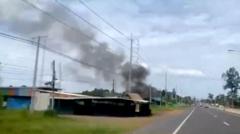Tensions flared dramatically this week as fighting erupted along the Thailand-Cambodia border, marking a lethal escalation in a long-standing dispute. According to Thai authorities, at least 12 nationals, primarily civilians, have lost their lives amid the border skirmishes. The Cambodian side's casualty count remains unverified, as both nations exchange blame for the aggression that led to the outbreak of violence.
This conflict isn’t new; the animosity dates back over a century when colonial-era borders were drawn following French rule in Cambodia. In 2008, relations soured further when Cambodia sought to register an 11th-century temple situated in the controversial area with UNESCO, triggering vehement protests from Thailand. Sporadic clashes have since surfaced, claiming lives on both sides and escalating tensions.
Since the assassination of a Cambodian soldier during a recent conflict in May, relations have hit a nadir, leading to both nations imposing various border restrictions. Cambodia initiated bans on Thai imports, including fruits and vegetables, and cut off essential services like power and internet across the border.
On Thursday, conflicting accounts arose surrounding the roots of the clash. Thai officials reported that Cambodian forces conducted drone surveillance before engaging Thai soldiers, while Cambodian defense representatives claimed that Thai troops instigated the confrontation by violating territorial agreements and firing warning shots.
International responses have ventured into a cautious realm, with Thai Prime Minister Phumtham Wechayachai characterizing the situation as "delicate," emphasizing the need for international law-oriented resolutions. His Cambodian counterpart, Prime Minister Hun Manet, expressed a desire for peaceful resolution, but indicated readiness to respond militarily if aggression continued.
Despite periods of intense conflict in the past, there’s a hopeful view that rapid de-escalation may follow this round of violence. However, observers note that a lack of strong, decisive leadership in both nations could complicate diplomatic efforts.
As of now, the conflict has remained localized, with travel advisories still urging caution around border crossings, especially for tourists visiting historically significant sites. Meanwhile, citizens have been cautioned by the Chinese government to steer clear of the Thai border due to the ongoing hostilities.


















